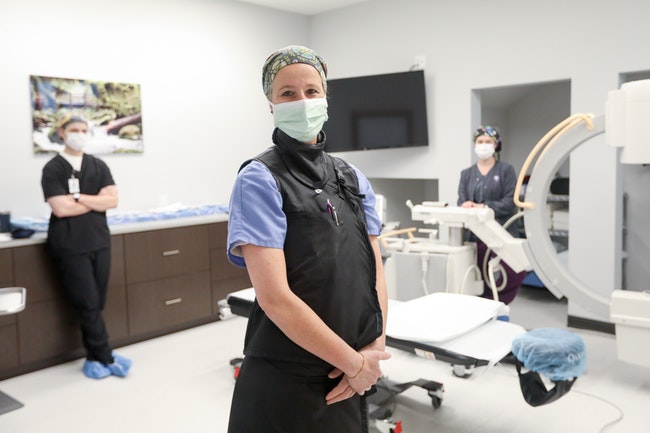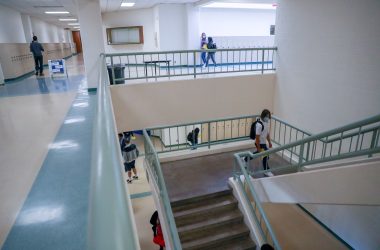 Rebecca Monreal, center, a physician at Salem Pain and Spine Specialists stands in a procedure room with Josh Outslay, medical assistant, and Carrie Davis, x-ray technician, on Wednesday, April 29. The clinic will soon be resuming non-urgent procedures as the state guidelines on medical procedures are relaxed. (Amanda Loman/Salem Reporter)
Rebecca Monreal, center, a physician at Salem Pain and Spine Specialists stands in a procedure room with Josh Outslay, medical assistant, and Carrie Davis, x-ray technician, on Wednesday, April 29. The clinic will soon be resuming non-urgent procedures as the state guidelines on medical procedures are relaxed. (Amanda Loman/Salem Reporter)
Delays have become a part of Dr. Lara Knudsen’s work.
Knudsen, the owner of Salem’s Happy Doc Family Medicine, described how one patient needing a hip replacement has had their surgery delayed. Another patient with cancer has had their surgery delayed. A third patient needs a biopsy. That’s also been delayed.
The cause of these delays is a March 18 order from Oregon Gov. Kate Brown directing hospitals, outpatient clinics, dentists, optometrists and others to stop “all non-emergency procedures.” The goal was to preserve surgical masks, gowns and gloves to protect health care workers treating COVID-19 patients.
While the restrictions have been in place, clinics and health care providers have performed a balancing act managing their patients’ conditions until they can be brought in for procedures while making sure they don’t worsen to the point they need urgent medical care.
“It’s doable and they’re doing it,” said Knudsen. “But it’s not ideal. People understand that these are extenuating circumstances.”
Clinics and health care providers are preparing for May 1 when the ban is lifted and Oregonians can again receive delayed dental cleanings, knee surgeries, fertility treatments and other procedures. Brown said she would lift the ban as long as the supply of personal protective equipment and hospital capacity is maintained in case of a surge of COVID-19 cases.
But after the restrictions have been in place for two and a half months, medical providers face challenges and uncertainties resuming business.
There’s a backlog of patients seeking delayed procedures. But clinics and health care providers will steadily ramp back up while prioritizing those that need the most urgent care. But clinics won’t suddenly be bustling with patients as procedures will gradually be offered again.
“Thus far, the temporary halting of procedures created a backlog of several hundred cases over the past month,” Salem Health said in a statement. “These are patients in our community who need care, even though it may not be urgent.”
In the statement, Salem Health said that the restrictions have preserved personal protective equipment and prevented the spread of COVID-19. But forgoing other medical procedures has had a significant financial impact.
According to the most recent numbers from the Oregon Employment Department, 30,863 people working jobs classified as health care and social assistance have filed for unemployment since March 15, 2568 of those in Marion County.
Hospitals lost $13 million a day in April, according to the Oregon Association of Hospitals and Health Systems. While a federal relief package will provide some help, the association has asked Brown for $200 million in state funds to stay afloat.
Knudsen, who typically sees 30 patients a week, said she and other similar practices have seen a large decrease in the volume in patients. In about the last week, she’s seen 12 patients including televisits, which she partly attributes to people getting less sick while staying home.
“You generally don’t get the other viruses and sinus infections that are floating around,” she said.
While insurance companies are covering televisits, she said it’s not clear what financial hit her clinic will take as it takes time for billing to go through. Knudsen’s clinic serves newborns to seniors, offers preventative care, annual physicals and minor procedures. She said that her clinic doesn’t offer many procedures that require the use of gloves or personal protective equipment.
While some patients require specialists or surgeries, none of them have had life-threatening conditions where a two or three-month delay would alter their clinical course. Knudsen said that she prescribed medicine for one patient waiting for surgery and others have had to wait.
While the ban on non-urgent procedures has been in place, health care providers have been trying to keep patients from seeking care at emergency rooms.
Medical Teams International, a charity that offers free medical care, has shifted the operations of its dental vans in the Pacific Northwest. One of its vans typically serving Salem provides extracts and fillings to vulnerable and marginalized people, said Cindy Breilh, Medical Teams executive director of U.S. programs. But that’s changed.
“Our goals are to keep people out of pain and keep out of the emergency room,” she said.
Now the van has treated about 60 patients who lack medical care, getting them on antibiotics or treating swelling, broken teeth or abscesses. To prevent the spread of COVID-19, she said that the clinic didn’t use drills or other tools that might create water droplets.
Northwest Human Services serves about 12,500 people with primary care, mental health and a dental clinic, said CEO Paul Logan.
With limitations on seeing patients in person, he said the clinic has been in touch with patients to make sure their heart disease, asthma and diabetes don’t worsen.
“I’m honestly excited about (non-urgent procedures) opening back up,” he said. “It’s important for patients and hospitals.”
In addition to serving Medicaid and Medicare patients, Northwest Human Services also has government contracts to serve specific populations, such as homeless individuals with mental health issues. Logan said that during the outbreak, Northwest Human Services has been in touch with Union Gospel Mission and Alluvium Mobile Health Team to monitor these patients.
He said that during the ban, the clinic has only offered dental care for abscessed or broken teeth, as well as issues causing pain or problems eating. The clinic has had to delay cleanings and other routine procedures, he said. That means 85% of the clinic’s appointments have been pushed back. They’re considering adding more dentists to clear the backlog.
 Rhianna Thornton, left, an administrative assistant at Salem Pain and Spine Specialists, trains McKenzie Curtis, a new receptionist next to an empty waiting room on Wednesday, April 29. The clinic will soon be resuming non-urgent procedures as the state guidelines on medical procedures are relaxed. (Amanda Loman/Salem Reporter) DATE TAKEN: 4/29/20
Rhianna Thornton, left, an administrative assistant at Salem Pain and Spine Specialists, trains McKenzie Curtis, a new receptionist next to an empty waiting room on Wednesday, April 29. The clinic will soon be resuming non-urgent procedures as the state guidelines on medical procedures are relaxed. (Amanda Loman/Salem Reporter) DATE TAKEN: 4/29/20
Carlos Monreal, the business manager for Salem Pain & Spine Specialists, said some patients come to the clinic as their last hope for relief with painful conditions. He said that the clinic’s three physicians specialize in treating joint, nerve and muscle conditions and typically do 40 to 45 procedures a week.
He said that some procedures require multiple treatments and some patients have seen their treatments abruptly halted by the order.
“For a month they’ve been understanding,” he said. “Now they’re getting impatient.”
He said the clinic will start doing the most urgent procedures once the ban is lifted but won’t ramp things up too fast to help prevent another flare-up of COVID-19.
But he said it’s hard on patients, some of whom are on their last nerve before having to go to the emergency room.
Contact reporter Jake Thomas at 503-575-1251 or [email protected] or @jakethomas2009.









